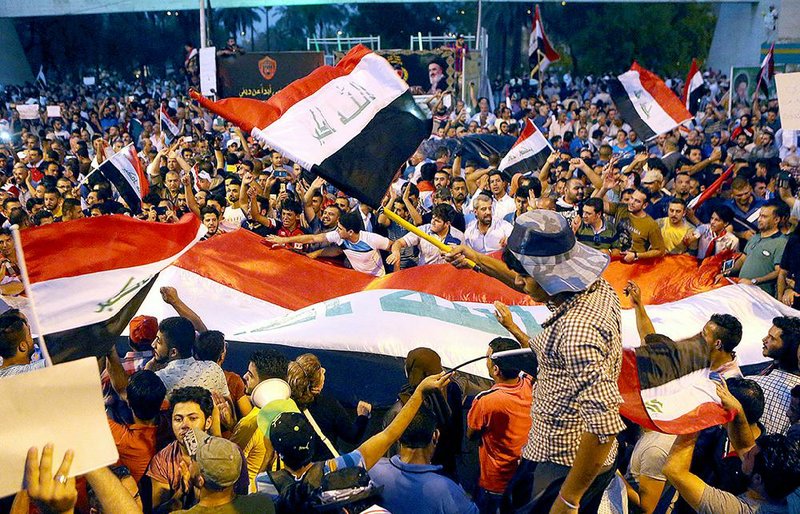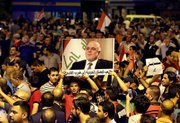BAGHDAD -- Iraq's prime minister announced Sunday a series of anti-corruption measures after weeks of protests against poor government services threatened to challenge his rule.
In statements posted to his official Facebook and Twitter accounts, Prime Minister Haider al-Abadi said his government would change the way ministers are selected, end the expensive security details of senior officials and reopen graft cases under the supervision of a high-level commission.
"After putting the trust in God and responding to the faithful calls of the marjaiya, which has drawn clear lines to activate political and administrative reforms, and to respect our beloved people's will in achieving their legitimate demands, I submit these procedures before the Cabinet," al-Abadi said Sunday, referring to clerics who have called for overhauls.
One dramatic step was al-Abadi's pledge to immediately abolish the post of his predecessor and political rival, Nouri al-Maliki. Al-Maliki currently serves as one of the country's vice presidents. The plan would abolish three vice presidential posts in total, as well as the offices of three deputy premiers. The positions are divided along sectarian and ethnic lines among the country's Shiites, Sunni Arabs and Kurds.
The other vice presidents are Ayad Allawi, a Shiite whose Sunni-dominated bloc won the most seats in national elections in 2010, and Osama al-Nujaifi, a prominent Sunni leader.
The plan would also end sectarian and party quotas that have dominated the appointments of top officials.
But it was unclear Sunday if al-Abadi would need a constitutional amendment to eliminate the vice president positions. Some of the measures, Iraqi legal experts said, would need approval from both the Cabinet and the parliament. Iraqi media reported Sunday that the Cabinet endorsed the decrees and approved the plan Sunday afternoon.
The parliament speaker, Salim al-Jabouri, also said Sunday that he supports the prime minister's announcement. The parliament is scheduled to vote on the proposals Tuesday.
There was some opposition to the plan, however.
"Fighting corruption and abolishing redundant posts is good, but these decisions are not well-studied," Mahmoud Othman, a Kurdish lawmaker, said by phone. "Those in these posts were voted in by parliament, and they belong to political blocs. Abadi, if none of these decisions were approved, should resign."
Many Iraqis blame former premier al-Maliki for the rampant corruption that has plagued the country's political life since the 2003 U.S. invasion installed a new system of government. He has been widely criticized for inflaming sectarian tensions and appointing loyal, less-qualified senior officers to Iraq's military ahead of the Islamic State group's advance last year. While al-Maliki issued a short statement approving of the plan, he previously criticized al-Abadi's rise to power last year and has repeatedly urged the current government to address the country's corruption and sectarian crises.
Al-Maliki, who served as prime minister from 2006 until the middle of last year, was widely accused of monopolizing power. He also was seen as a sectarian leader who did much to alienate the country's Sunni minority, including using security forces to break up their protests. When the Islamic State captured Mosul and other cities last summer, many Sunnis there initially welcomed the extremists as liberators.
Shortly after al-Abadi's decision, Iraqi prosecutors said they'll investigate corruption charges against Deputy Prime Minister Baha al-Araji, local media reported. Al-Araji said he requested a probe into accusations leveled against him by "ill-intentioned and enemy media outlets and social media networks."
The parliamentary bloc of Shiite cleric Muqtada al-Sadr, to which al-Araji belongs, welcomed al-Abadi's plan, lawmaker Ameer al-Kinani said in a statement. Al-Nujaifi also supported the move, Al Mada Press, a local news agency, reported.
On Friday, tens of thousands of Iraqis demonstrated across the country and in the capital, Baghdad, against dishonest leaders they say have plundered public wealth and neglected the country's war-battered infrastructure.
About 1,000 demonstrators gathered late Sunday in Baghdad's Tahrir Square in support of al-Abadi's plan.
The protests came during a searing heat wave in which temperatures rose to 120 degrees or more in the past several weeks. The heat has been particularly unbearable with the country's limited power supply, allowing Iraqis electricity only a few hours a day to run fans or air conditioners.
The country's powerful Shiite militias -- whose political influence has grown as they overtake the Iraqi army in the fight against Islamic State extremists -- also threw their weight behind Friday's protests. Their participation presented a challenge to al-Abadi from his own Shiite constituency.
The demonstrations also prompted the office of the influential Shiite religious leader Ayatollah Ali al-Sistani to urge al-Abadi to implement more sweeping overhauls. He said Friday that al-Abadi had not done enough to fight corruption within the Iraqi state.
Through his spokesman, Ahmed al-Safi, al-Sistani said the prime minister must be more "daring and courageous" in his steps to change the government, urging him to strike "with an iron fist anyone who is tampering with the people's money."
Iraq ranked 170 of 175 countries in Transparency International's 2014 Corruption Perceptions Index. Previous governments have promised action against graft, without always delivering. The Commission of Integrity, an anti-corruption agency, in 2012 accused 14 generals and Defense Ministry officials of taking kickbacks in an arms deal with Russia worth $4.2 billion. All the men denied the allegations; one resigned.
A 2013 United Nations report found that half a million Iraqis paid 1.9 million bribes to civil servants over the course of a year, mostly for power and water services.
Iraq is currently embroiled in a battle with Islamic State militants who have seized wide swaths of the country and displaced more than 3 million people. In July, more than 1,300 Iraqis were killed because of the violence, the U.N. said.
Despite seizing Saddam Hussein's hometown of Tikrit and some areas, the advance of Iraqi forces has waned. Efforts to win back the western cities of Fallujah and Ramadi have stalled. Operations to recapture Iraq's second-largest city, Mosul, have been postponed indefinitely. Kurdish forces, meanwhile, have made modest advances in Iraq.
Iraq, which holds the world's fifth-largest oil reserves and significant amounts of gas, has struggled to finance its war with the Islamic State due to lower oil prices and high military spending. The consequences have manifested over al-Abadi's year in office, with the fallout ranging from worsening electricity problems to the government's failure to keep up with budget payments to the semi-autonomous Kurdish government.
Information for this article was contributed by Mustafa Salim and Erin Cunningham of The Washington Post; by Sinan Salaheddin and Vivian Salama of The Associated Press; by Zaid Sabah, Nafeesa Syeed, Aziz Alwan and Khalid Al-Ansary of Bloomberg News; and by Omar al-Jawoshy, Tim Arango, Falih Hassan and Ahmed Salah of The New York Times.
A Section on 08/10/2015

